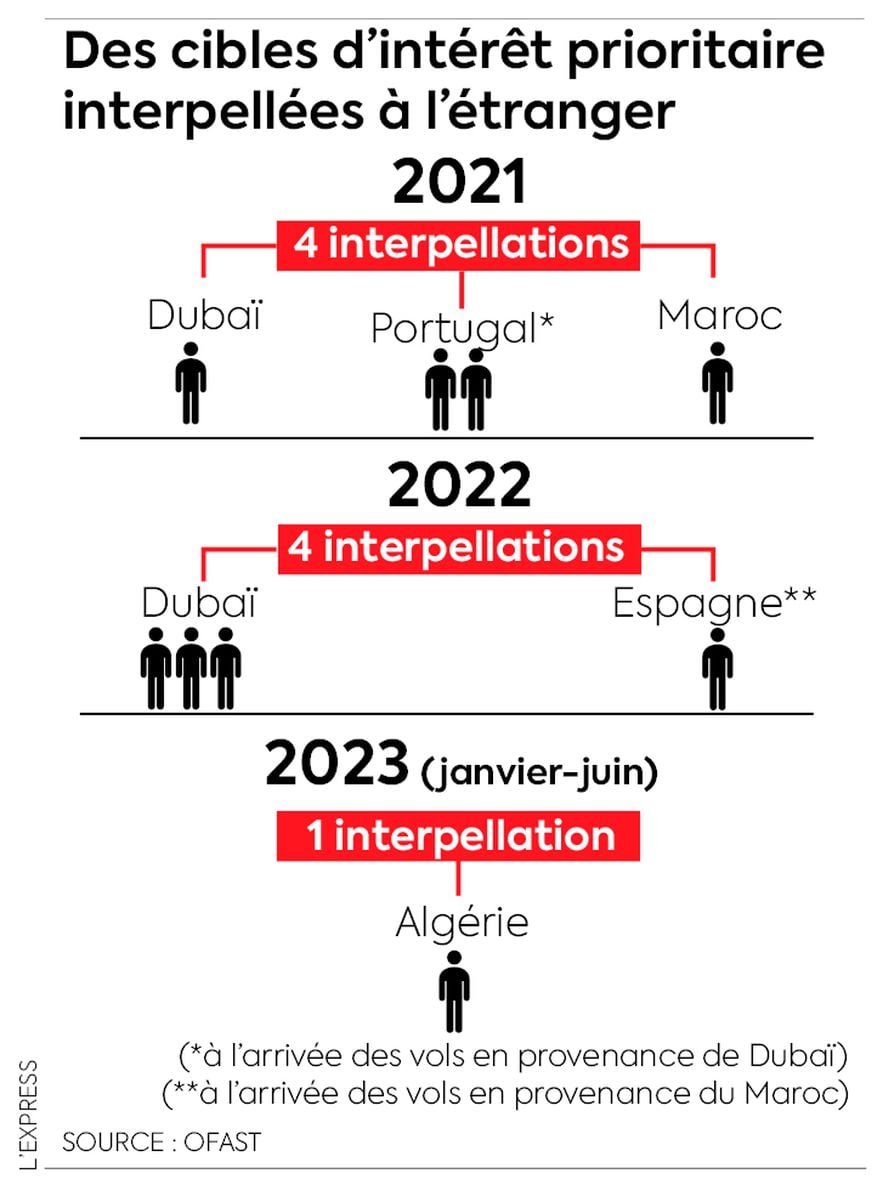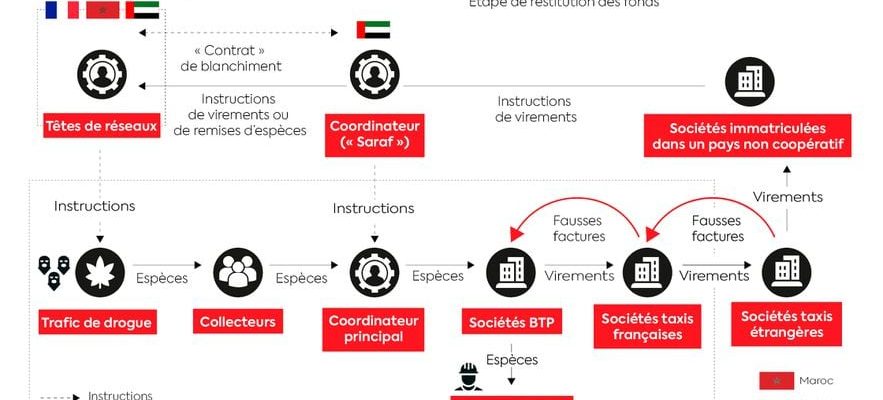“Operation flick” and “XXL communication”, mocks the magistrates’ union. An “octopus”, a “hydra”, observe the magistrates, sometimes disillusioned. Drug traffic has never been so flourishing in France, driven by constantly increasing consumption. “Checkpoints”, claimed borders between the street and the kingdom of drug dealers, now cut off certain neighborhoods from the rest of the city. Acts of torture and murderous score-settling are increasing there, we are also discovering commandos of minor killers, sometimes unaware of their sponsor. “Vertigo” and “on the edge of the abyss”, say the senators of the commission of inquiry into drug trafficking in France.
Faced with the crisis, the government is trying to regain control. “XXL net space” operations launched in Marseille, Sevran, Toulouse, Strasbourg, Nantes, Lille… Discreet anti-money laundering investigations, too, in pursuit of ever more ingenious criminals. Out of sight, a silent struggle is taking place between the police and these deal princes, refugees in Dubai, Morocco or Spain where they claim to launder dirty money in complete peace. Each camp is trying to pull every lever to outrun the other. Investigation into a war with political, security, diplomatic, technological and scientific ramifications.
EPISODE 1 – These neighborhoods governed by dealers: investigation into the extent of drug trafficking in France
EPISODE 2 – Colombian chemists, encrypted messaging… The unexpected accomplices of drug trafficking in France
Chapter 5 – In search of the laundresses
Whitening is sometimes as simple as a scratch game. In October 2023, three people were arrested in Seine-Saint-Denis for maneuvers involving scratch tickets. Thanks, it seems, to a network of tobacco bar managers, they contacted the lucky winners at the PMU or the Française des Jeux to offer to exchange their ticket for a sum greater than their winnings, in cash. Everyone was there, especially these traffickers who, for this small commission, could obtain a bank transfer and get their money into the legal circuit.
“I asked that we carry out a lot of work to find the money. ‘Follow the money’, as they say,” warns Gérald Darmanin. Until recently, the subtleties of disposing of dirty money eluded investigators somewhat due to lack of sufficient training. “We had a shortage of financial investigators, which is being resolved,” confirms Samuel Vuelta-Simon, the public prosecutor of Toulouse. A long neglected and yet essential aspect, as the motivations of traffickers boil down to the millions of euros that they manage to rake in with impunity. “The prison risk is assumed by the traffickers. What hurts them is to hit the accumulated wealth,” summarizes Olivier Caracotch, the Dijon prosecutor.
“Narcos” traditionally resort to “smurfing”, as financial sleuths say, a dissemination of small sums among those around them, destined to remain well below the alert thresholds. Buying a car with cash in Germany, where this transaction is legal, is also a classic, investigators say, like local money laundering. The magistrates always cite the same type of business, “barber shops”, mini-markets without any customers, in which the cash from drugs is discreetly collected and then subsequently returned to a bank account, in a circuitous manner. “Local laundering serves above all to establish one’s position in the local fabric”, more than to transfer large sums, explains Anne-Sophie Coulbois, the head of the Central Office for the Repression of Serious Financial Delinquency (OCRGDF). ).
Previously struggling to fight this invisible crime, the Bobigny public prosecutor’s office has been carrying out ultra-offensive action for a year against these small businesses with somewhat too surprising resources, in conjunction with experts from Bercy. “We are in short circuit with Tracfin. They inform us of companies which present characteristics of laundering companies, that is to say those which experience a lot of movement from their creation. Tracfin can oppose any movement if it there is suspicion”, describes Eric Mathais, the public prosecutor.
In this scenario, the Bobigny public prosecutor’s office has also become accustomed to requesting the seizure of funds, on the basis of an investigation for money laundering. The measure has made it possible to collect a whopping 7.3 million euros since September 2023. A lot, but less than the 40 million euros laundered in five years by a network dismantled in May 2023 in the Marseille metropolitan area. When the sums disappear in this way, it is because the trafficker is using the compensation method, which is both ultra-simple and extremely complex to follow. The idea? Give the money in cash to a partner who will make a bank transfer of the same amount, minus their commission, generally equal to 10% of the total. This secret banker, often nicknamed “saraf”, a stockbroker in Arabic, must have a comfortable financial base, in a country sheltered from cooperation agreements with France. Between the two transactions, an intertwining of intermediaries, more or less fictitious companies, if possible in as many opaque countries as possible.
3796 cover drug compensation scheme
© / The Express
Ofast believes that the construction sector is particularly susceptible to these schemes, due to the frequent practice of hidden work within it. The anti-drug trafficking body also cites “Chinese financial and commercial hubs”, these “wholesale centers which house a multitude of companies”, notably the Fashion Center in Aubervilliers, in Seine-Saint-Denis. During the trial of wholesale launderers, this March 22, 2024, the Bobigny prosecutor’s office described the business center as “a hub of international laundering which recycles money from cannabis trafficking”. The company of Bingwu Z., one of the defendants, transferred 1.1 million euros of cash in two months.
Chapter 6 – The hideouts of the “narcos”
November 2023. The elite of the French police receive Abdullah Khalifa Al Merri, the head of the Dubai police, in Nanterre, at the headquarters of Ofast and other services of the Ministry of the Interior. The Emirati official has just met Gérald Darmanin in Beauvau, the meeting presents itself under the best auspices. The agenda revolves around the treatment of major drug traffickers in the United Arab Emirates, when the Dubai official dampens French hopes. “With us, there is a tradition of welcome,” he says. “Humanity is important,” he also says when it comes to the fate of “narco” families, where the “big cops” of Nanterre expected maximum firmness.
Between the two countries, we have always struggled to understand each other on the issue. Twenty-five of the fifty largest French dealers, “those who we think have the drugs in France” Gérald Darmanin used to say, stay in Dubai, under modest statuses, often self-employed, despite their immense fortune from which they benefit the local fabric. In complete peace of mind, equipped with their smartphone with encrypted messaging, they organize their traffic from the Emirate, controlling the delivery of products and money remotely. “I sent the list of traffickers who had taken refuge in Dubai to the Emirati Minister of the Interior,” explains the tenant of Beauvau, who has already visited the Emirates twice, and plans to return there before the summer. With contrasting results, for the moment. Between 2021 and 2023, four “targets of priority interest”, according to the jargon of French police officers, were arrested in Dubai. But at the beginning of January 2024, Abdelkader Bouguettaaïa, known as “Bibi”, sentenced to nine years in prison in his absence, was released, as well as Abdel Karim Touil, another alleged “narco”. The documents necessary for their extradition had not arrived within the stipulated period of 40 days, argued the Emiratis. In order to put an end to this slag, a liaison magistrate between the two countries will arrive in Abu Dhabi on April 15.

3796 cover drug arrests
© / The Express
Ofast has drawn up a composite portrait of the great French trafficker. A “man aged 40 on average”, “mainly from a sensitive city”, with “usually links with organized crime”, “mostly possessing dual nationality with a Maghreb country”, and above all endowed of “assets exceeding ten million euros”. None live in France. Their fortune made, these “narcos”, often survivors of multiple territorial wars, emigrate in order to “remove the risk of arrest”. Particularly in Morocco, where cooperation with the French police is historically poor. “Moroccans sometimes cooperate in cases where their nationals are not involved, but for the rest, letters rogatory… it’s very complicated,” recalls Commissioner Jean-Marc Souvira, internal security attaché at the embassy. of France between 2015 and 2016, a time of great anger between Rabat and Paris. “The Moroccans use their police cooperation as a diplomatic lever. It depends on the moment, their interest, our attitude on this or that issue,” explains Jean-Marc Souvira.
Contrary to custom, on March 8, 2024, trafficker Félix Bingui was arrested with the active help of the Moroccan police. “Proof that you should never leave as a defeatist,” underlines prefect Frédérique Camilleri. The dealer probably supervised transfers of cannabis resin, a historical specialty of the Rif region, where “illegal cannabis cultivation”, “tolerated by the authorities”, and placing the country in first place in the world, represents “an essential part of economic activity”, analyzes Ofast.
A few hundred kilometers further north, the Costa del Sol, in Spain, is the third most popular destination for traffickers on the run. They can directly supervise, with their feet in the water, the routing of convoys from Morocco. However, cooperation with France is excellent. On March 11, 2024, French and Spanish police officers jointly arrested thirteen alleged members of the DZ Mafia, suspected of having taken part in the attempted murder of “Sarkozy”, Mohamed T., his real name, the former manager of the no deal from Castellane. The destination is not recommended for dealers affected by an Interpol red notice, synonymous with a request for arrest.
In Dijon, one of the city’s most important trafficking networks is run by siblings entirely relocated abroad. The three brothers reside respectively in Dubai, Morocco and Spain.
.
